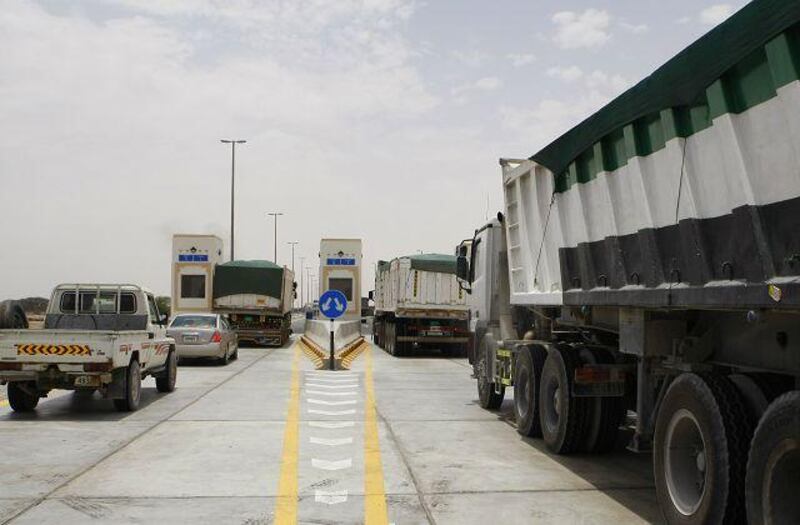SHARJAH // Drivers of heavy lorries passing through Sharjah have begun to pay a Dh100 fee at the emirate's first tollgate, in Al Dhaid. The new charge generated a rush on Friday evening as drivers hurried to pass through the gate before collections began at midnight. The toll system, which opened after two weeks of trials, is expected to generate Dh150 million per year. "We had about 30 trucks in the queue when the police officer on duty announced it was time we start collecting," said Hussain Mohammed, one of the toll collectors. "About 100 trucks had just passed in one hour from 11pm to 12. Most truck drivers wanted to escape the first day of payment."
As many as 5,250 lorries passed through the gate on a daily basis before the toll system went into effect. Drivers had received brochures about the new fees and radio, television and print advertisements also spread the word, said Omran al Humairi, the director of the tollgate project. The Dh100 toll applies to tanker lorries and lorries with trailers. Six- and 10-wheel lorries without trailers would pay only Dh25, Mr al Humairi said.
Sharjah Police have set up a small office at the toll plaza to help with regulating the traffic flow, said Capt Khalid al Shargi, the co-ordinator of traffic in Al Dhaid. "We shall be handling stubborn truck drivers who don't want to pay, those obstructing traffic and [those] making other traffic violations," he said. The system seemed to be working well on its first day of operation. No fines had been issued by noon and only two lorry drivers had arrived without the Dh100 to pay the toll, Capt al Shargi said.
"We would take the truck registration card, ask them to pass through the gate and make a U-turn and receive their card as they return where they came from," he said. The reprieve for non-paying drivers is likely to be temporary. Those without the funds to pay the toll would eventually be fined, Capt al Shargi said. Officers at the tollgate were turning away drivers who did not have the exact amount of money. Officials had said there would be no change available at the gates.
Zubair Hammed, a truck driver with Raja Stones Transport, had a Dh200 note, but toll collectors would not take it, despite his pleas. Mr Hammad said: "The man in the gate simply told me, 'It's a law. If you don't have Dh100, give me your truck registration card and go back to change the money and return with Dh100'." The first phase of the toll system was using cash, but it would move to electronic payments in its second phase, which was due to begin before the end of this year, Mr al Humairi said.
Drivers will be able to pay through prepaid cards and weight sensors will be installed to distinguish heavy lorries from lighter vehicles. "If you want only trucks to pay, you can configure it," said Mr al Humairi. "Technology has been so generous to our generation." One concern about the system was the safety of the large sums of money collected. Capt al Shargi said police had set up a large safe in their offices. Police would be present at the collection point and several monitoring cameras had been installed, he said.
Drivers had mixed reactions to the system, with some complaining that it had not delivered on its promise of cutting down on the amount of traffic on the road. "We stayed in the queues for about 15 minutes in the morning," said one driver who did not want to be named. "It has never been like this and I think it's getting worse. The fee collectors were slow and often quarrelling with drivers." Eissa Ali, another driver, also complained of the toll collectors being slow and wondered whether they had received enough training.
"The problem was that all the focus was on us and the fee collectors seem not to be prepared for their big task," he said. Mr al Humairi emphasised that the money collected from the tolls was to be used only for road maintenance. While tolls were expected to bring in Dh150m, the emirate spent Dh200m each year to maintain the road, he said. @Email:ykakande@thenational.ae






